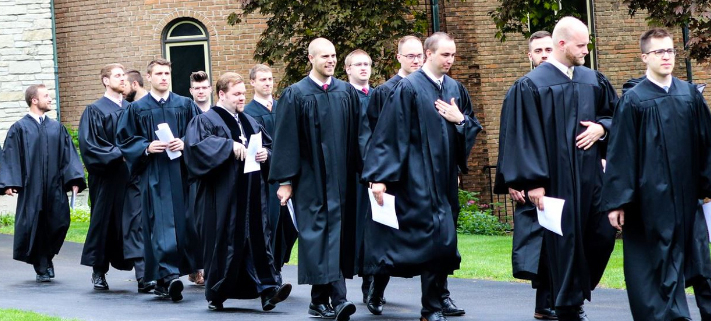The Book of Revelation: Part 9
Comfort in the midst of conflict: Revelation 17 to 19
Timothy J. Westendorf
The vision of the seven bowls (worsening spiritual plagues from the proliferation of false teaching) leads to another vision. The connection between the two, reminding us that we’re still dealing with similar subject matter, is that one of the bowl-carrying angels speaks to John and takes him to see “the punishment of the great prostitute, who sits by many waters.” That is the focus of the next three chapters.
Babylon, the prostitute
In chapter 17 John is carried in spirit by the angel to “a wilderness” where he sees “a woman.” We’ve encountered this imagery before (cf. chapter 12). There we see the woman (the church), pursued by the dragon (Satan), fleeing into the wilderness (this world). She is attacked and harassed there by the dragon and his two allies, the beast from the sea (ungodly government) and the beast from the earth (ungodly religion).
The surprising thing is that the woman is described very differently here. She is no longer running for her life. She is now sitting on the beast from the sea and even taking on its characteristics! The name written on the woman’s forehead is significant. It is called “a mystery,” something that would remain hidden to human understanding if not revealed by God himself. The woman is described as a prostitute named “Babylon” (a representative title for the enemies of God’s people).
To understand what John is seeing, contemplate his reaction. He is greatly astonished. Something is terribly wrong with the picture. The bride has forsaken her relationship with the Bridegroom and has committed adultery with the powers of the world! This picture is all too familiar to those who know the history of Old Testament Israel. When that special nation turned from faithfulness to the Lord and his Word, running instead after other gods, he called her an unfaithful and adulterous wife (e.g. Jeremiah 3:20). An unsettling reality is shown to John: The same thing would happen in the New Testament era. The unfaithful (“apostate”) church would turn from trust in the Savior’s Word of grace and forgiveness, adopting the world’s religion of self-righteousness. By her words and actions she would promote spiritual drunkenness, causing people to become confused and befuddled about God’s truth and a Savior from sin. She would become wealthy and prestigious. She would even wage war against the faithful bride of Christ who refused to join her ranks!
While there are details that deserve further study and explanation, suffice it to say for this brief overview that church and world history, with far too many examples to mention here, have borne out the truth and accuracy of this revelation. And until this present age comes to an end we can expect to see more of the same.
Babylon, the fall
This vision is as troubling to Christ’s true and faithful church today as it was for John so many years ago, but chapters 18 and 19 bring comfort to conflicted souls. Jesus is still faithful and true. Jesus still sees what is happening in this world. Jesus is still the King of kings and Lord of lords. Jesus still lives and rules all things for his believers, the church.
The unfaithful church will have her day, but it will come to a fateful end. Until that time, when all believers will rest and rejoice at the wedding supper of the Lamb, Jesus calls us to listen to his Shepherd voice and place our confidence in his promises.
He is trustworthy.
Reflect on Revelation chapters 17 to 19
- Give three reasons why the woman would become a prostitute on the beast.
- The once faithful bride of Christ (the church) has abandoned the teachings of the Scriptures because the teachings of men are more attractive. The beast is a liar and has been a liar from the beginning. Just as Adam and Even listened to him, so some have listened to his lies and abandoned God’s truth.
- Jesus said that those who listen to his voice would experience difficulties and opposition in this life. Some have abandoned the foolishness of God that brings so much opposition so they will not have to suffer persecution, ridicule, and opposition.
- Satan tempted Jesus and said that if he would bow down and worship Satan, Satan would give him all the world’s glories. The temptation remains for believers: trade Jesus for wealth, power, and prestige. Note the description of Babylon’s fall. She is dressed in purple and scarlet with gold, precious stones, and pearls. The merchants will weep at her fall; their source of wealth is gone.
- Think of ways you might incorporate the thoughts of this section into your personal prayers this week.
We pray that the Lord would keep us faithful to his Word.- We also pray for strength to resist the temptations that surround us to place life’s blessings—including its financial blessings—before the One who has shed his blood to redeem us.
- We pray that we do not become so short-sighted about things in this world that we lose sight of our eternal home and our Savior who secured it for us.
- We pray not just for ourselves, our friends, and our congregations to remain faithful, but we expand our prayer to include Christians all over the world.
Contributing editor Timothy Westendorf is pastor at Abiding Word, Highlands Ranch, Colorado.
This is the ninth article in as 12-part series on the book of Revelation. Find the article and answers online after August 5.
SUBMIT YOUR STORY
Do you have a manuscript, idea, or story from your own life you’d like to share for use in Forward in Christ or on wels.net? Use our online form to share it to our editorial office for consideration.
SUBSCRIBE TO FORWARD IN CHRIST
Get inspirational stories, spiritual help, and synod news from Forward in Christ every month. Print and digital subscriptions are available from Northwestern Publishing House.
Author: Timothy Westendorf
Volume 106, Number 8
Issue: August 2019
Copyrighted by WELS Forward in Christ © 2021
Forward in Christ grants permission for any original article (not a reprint) to be printed for use in a WELS church, school, or organization, provided that it is distributed free and indicate Forward in Christ as the source. Images may not be reproduced except in the context of its article. Contact us






